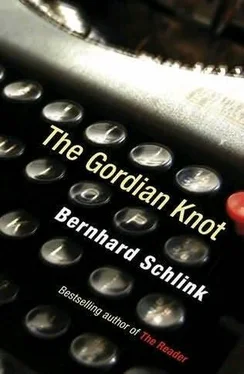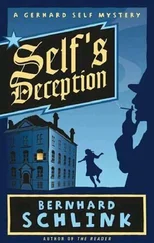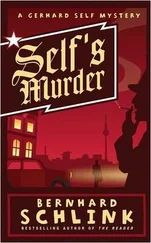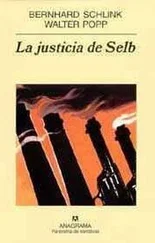He ordered another cup of coffee. Regardless of how the officers became involved, they were after him now. Did they still just want to deport him? Or drag him before a court? Or deport him and make sure he ended up before a German court? I could see a lawyer, Georg thought, or, better, I could go find that reporter and then talk to a lawyer.
The newspaper was still lying in front of him. The title photo showed the aircraft carrier Tennessee entering the Gulf of Mexico, with two helicopters hovering above it. Georg’s glance rested on the two helicopters, moved away, and then returned to them.
Two helicopters, he thought, not one. He had read in the Newsweek article that in the development of a new attack helicopter for the NATO armies, a consortium of European aircraft builders was developing a new attack helicopter in competition with Gorgefield, an American company based in California. Both parties were proposing a similar helicopter with stub wings, ABC rotors, and RAM-coating. Both parties, it was rumored, had made the same technological breakthrough.
Georg couldn’t remember whether this concerned the wings, the rotors, or the coating, but he remembered clearly that it was the same breakthrough: the helicopters had the same qualities and performance capabilities.
So this is not about the Soviets and the Europeans, but about Gorgefield and Mermoz! Had Bulnakov come up with a double disguise: as an Eastern Bloc agent and the head of a translation agency? As he went through the story again Georg considered his questions-the important as well as the less important ones. Bulnakov was less important. Important was who he worked for. The CIA? Georg could imagine the worst of any secret service, but he couldn’t imagine the CIA undertaking industrial espionage, espionage at a European industrial enterprise working under contract to an American one. That the CIA might cover and help with such espionage was possible, and would explain the two agents in the MacIntyre Building. It would also explain the attitude of the French. Bulnakov would have asked the CIA to put in a word with the French secret service, which would have passed the information he wanted to disseminate about Georg to the police, the town council, the bank, and Georg’s landlord.
But if Bulnakov wasn’t working for the CIA, who was he working for? And what about Townsend Enterprises? Was it Gorgefield Aircraft’s own secret service, its department specializing in sensitive issues, dirty business? Or was Bulnakov, or Benton, as Georg was beginning to call him, an independent contractor whose company, Townsend Enterprises, could be hired to carry out shady deals ranging from espionage to murder? Had Gorgefield hired Townsend Enterprises for Operation Mermoz? They had probably given the job a more elegant name: the Mermoz Study, the Mermoz Investigation, the European Helicopter Project.
Even without being able to answer these questions, the story now made sense. Françoise was from New York, worked for Townsend Enterprises in New York, had worked in Cadenet, and then returned to New York. Was she still working for Townsend? Was she still Bulnakov’s/Benton’s lover?
Georg had a story that made sense, but no idea what to do next. He didn’t know if he could interest a reporter in it, or if newspapers would print such a story or readers would want to read it. As it was, he didn’t have much evidence, and didn’t see how he could get more. Without evidence a lawyer couldn’t help him either-that is, if a lawyer would even want to help him. The authorities are looking for me, damn it! I’m a wanted man!
Should he give up or go on? Those were the two alternatives he had been considering. Now he didn’t even know what they meant. What should he go on doing, and how? Did giving up mean going to the police, to the German consulate, going underground in the city, or going out West? Georg paid and left. If nothing else, he could at least fill in the gaps of the story. The library at Columbia must have technical journals dealing with helicopters, weapon systems, and the armaments industry that could clarify whether Gorgefield Aircraft had put out the concept of its helicopter after Operation Mermoz. It could also clarify whether Townsend Enterprises was a branch of Gorgefield or an independent company that belonged to Benton. Georg wanted to know, even if he wasn’t sure how this knowledge could help him.
He called Helen from a pay phone. “It’s me, Georg.”
“You’re calling in the middle of the night?… Oh, it’s seven. God, is everything all right?”
“I’m sorry, it’s again about the matter I told you about…”
“I tried calling you yesterday evening. A year ago your girlfriend”-she said the word as coolly as she could-“was living on Prince Street. A colleague of mine in the Russian Department had her in her conversation class.”
“Where?”
“In her conversation class… Oh, 160 Prince Street near Sixth Avenue and Houston.”
Georg took a deep breath. “Thank you, Helen. I hope this didn’t…”
“No, it didn’t put me out. I showed my colleague the picture, and she gave me her address. And her name: Fran Kramer.”
“Fran Kramer… I looked for Kramers in the phone book. You wouldn’t believe how many there are. Kramers, Krameks, Kramerovs, and so on. Three whole pages.”
“Mm.”
“Anyway, thanks. Would you be mad at me if I asked for one more favor?”
“If I was, you wouldn’t ask?”
“Since the CIA is already mad at me, or the FBI, or the police, I don’t know who, I’d be happier if you weren’t too.”
“What are you talking about?”
Georg told her. He had gone over the story so many times in his mind, in true and false versions, that he managed to tell her in a few words. “And as a result,” he concluded, “you’ll find me in today’s New York Times , on page fourteen.”
“What are you going to do?”
“I don’t know. I have no idea what they’re intending to do to me, how intensively they’re looking for me, or who’s looking. Can you call Townsend Enterprises and act like you are an executive secretary calling from IBM, Nabisco, or Mercedes-Benz, and tell them you would like to make an appointment for someone to discuss an important security issue? If they fall for it, then it would point to the fact that Townsend is an independent enterprise, rather than a branch of Gorgefield Aircraft.”
“Don’t you have more immediate problems?”
“I do, but this one I believe we can get to the bottom of. I want to know what’s going on at Townsend. Not to mention that it would be a relief to know I’m not up against America’s most important armaments enterprise, but that crazy cowboy Benton.”
“But isn’t it clear already that Gorgefield Aircraft… I mean, could Benton send government officers to do his dirty work?”
“Who knows? Would you do me the favor and call? Call from a quiet pay phone somewhere, and the matter can be dealt with in two or three minutes.”
“Okay, I’ll give it a try later this morning. This evening you can reach me at home. In the afternoon I’ll be at Columbia. Be careful.”
AT THE ENTRANCE OF the Seventy-ninth Street subway station Georg was about to rush down the stairs with the throng of people when he realized the absurdity of hurrying. The one thing he had more than enough of was time. He would walk.
He strolled up Amsterdam Avenue toward Columbia. He didn’t think the library would be open before eight. He remembered that he had walked up Amsterdam once before, on his first day in New York, from the Epps’ apartment to the cathedral. That had been two months ago. Back then nobody was out to get him, he knew where he would sleep, and he could return to Germany at any time. Nothing was left of that now. And yet he felt lighthearted. The first few weeks in New York he had been stumbling around in the dark. He had felt as if a wound was being relentlessly rubbed raw. He had arrived in America wounded, and every pointless movement had hurt and exhausted him, driven him further into the wariness and distrust he had brought with him from Cucuron. Bulnakov/Benton was right: he had become another person.
Читать дальше












